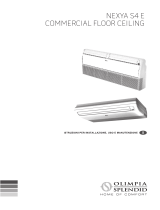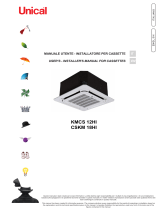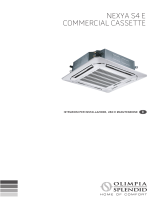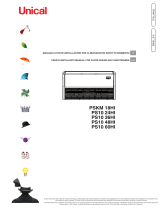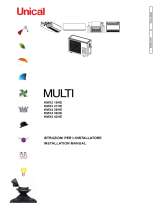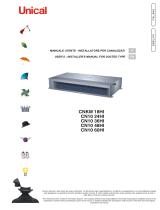Page is loading ...

English
Italiano
INSTALLATION MANUAL
For safe and correct use, please read this installation manual thoroughly before installing the air-conditioner
unit.
MANUALE DI INSTALLAZIONE
Per un uso sicuro e corretto, leggere attentamente questo manuale di installazione prima di installare il condizionatore
d’aria.
FOR INSTALLER
PER L’INSTALLATORE
Air-Conditioners Indispensable Optional Parts
BRANCH BOX
PAC-AK50BC
PAC-AK30BC
HFC
utilized
R410A
ONLY FOR R410A OUTDOOR UNIT
ONLY FOR INDOOR USE

2
Contents
1. Safety precautions ................................................................................... 2
2. Selecting a location for installation ........................................................... 2
3. Confirming Supplied Accessories ............................................................ 3
4. Dimensions and required Servicing space of Branch Box ....................... 3
5. Refrigerant piping .................................................................................... 4
6. Mounting the branch box ......................................................................... 5
7. Installing refrigerant piping ....................................................................... 5
8. Installing Drain piping .............................................................................. 6
9. Electrical work .......................................................................................... 7
10. Test run .................................................................................................... 9
s Before installing the unit, make sure you read all the “Safety precau-
tions”.
s Please report to your supply authority or obtain their consent before
connecting this equipment to the power supply system.
Warning:
Describes precautions that must be observed to prevent danger of injury or
death to the user.
Caution:
Describes precautions that must be observed to prevent damage to the unit.
Warning:
• Ask a dealer or an authorized technician to install the unit.
• For installation work, follow the instructions in the Installation Manual and
use tools and pipe components specifically made for use with refrigerant
specified in the outdoor unit installation manual.
• The unit must be installed according to the instructions in order to minimize
the risk of damage from earthquakes, typhoons, or strong winds. An incor-
rectly installed unit may fall down and cause damage or injuries.
• The unit must be securely installed on a structure that can sustain its weight.
• If the air conditioner is installed in a small room, measures must be taken to
prevent the refrigerant concentration in the room from exceeding the safety
limit in the event of refrigerant leakage. Should the refrigerant leak and cause
the concentration limit to be exceeded, hazards due to lack of oxygen in the
room may result.
• Ventilate the room if refrigerant leaks during operation. If refrigerant comes
into contact with a flame, poisonous gases will be released.
• All electric work must be performed by a qualified technician according to
local regulations and the instructions given in this manual.
• Use only specified cables for wiring.
• The terminal block cover panel of the unit must be firmly attached.
• Use only accessories authorized by Mitsubishi Electric and ask a dealer or
an authorized technician to install them.
• The user should never attempt to repair the unit or transfer it to another loca-
tion.
• After installation has been completed, check for refrigerant leaks. If refriger-
ant leaks into the room and comes into contact with the flame of a heater or
portable cooking range, poisonous gases will be released.
• Be sure to connect the power supply cords and the connecting wires for the
indoor units, outdoor units, and branch boxes directly to the units (no inter-
mediate connections).
Intermediate connections can lead to communication errors if water enters
the cords or wires and causes insufficient insulation to ground or a poor
electrical contact at the intermediate connection point.
(If an intermediate connection is necessary, be sure to take measures to pre-
vent water from entering the cords and wires.)
Caution:
• Make sure that the refrigerant pipes are well insulated to prevent condensa-
tion.
Incomplete insulation may cause condensation on the surface of pipes, wet-
ting of the ceiling, floor and other important properties.
• Make sure that the drainage pipe is carried out correctly following this manual
and that it is insulated in order to prevent condensation.
Any deficiency caused by piping may result in water leakage, wetting of the
ceiling, floor and other personal properties.
1. Safety precautions
After installation work has been completed, explain the “Safety Precautions,” use,
and maintenance of the unit to the customer according to the information in the Op-
eration Manual and perform the test run to ensure normal operation. Both the Instal-
lation Manual and Operation Manual must be given to the user for keeping. These
manuals must be passed on to subsequent users.
: Indicates a part which must be grounded.
Warning:
Carefully read the labels affixed to the main unit.
This installation manual is only for the branch box installation. In installing the indoor units and outdoor units, refer to the installation manual attached to each
unit.
2. Selecting a location for installation
* The branch box is only for indoor use.
Please attach the special optional cover (PAC-AK350CVR-E) to install the branch
box in the outdoors.
• Ensure that the branch box is installed in a location which facilitates servicing and
maintenance. (ensure that the required maintenance hole or service space is
available).
• Do not install near bedrooms. The sound of refrigerant flowing through the
piping may sometimes be audible.
• Ensure that it is located where noise in operation will not be a problem.
After power is supplied or after an operation stop for a while, a small clicking
noise may be heard from the inside of the branch box. The electronic expan-
sion valve is opening and closing. The unit is not faulty.
• Determine the route of refrigerant piping, drain piping, and electrical wiring be-
forehand.
• Ensure that the location of the installation is such that the length of refrigerant
piping is within the specified limits.
• Ensure that the unit is out of reach of children at least 1.8 m above the floor.
• Do not install in location that is hot or humid for long periods of time.
• Ensure that the branch box is installed above the ceiling of corridor, bath room,
etc., where persons are not regularly there (Avoid installing at around center of
the room.) for maintenance.
• Ensure that the location of the installation is such that the down-gradient of the
drain piping is greater than 1/100.
* Ensure that the unit is installed in a location able to support its weight.
Warning:
Ensure that the unit is installed firmly in a location able to support its weight.
If the installation is of insufficient strength the unit may fall, resulting in injury.

3
S1
S2
S3
S1
S2
S3
S1
S2
S3
S1
S2
S3
S1
S2
S3
S1
S3
S2
TB3BTB3C TB3A
TB3DTB3E
TB2B
320
A
402
24
A
B
C
D
E
F
12
198
450 91
55
73
25
75 75 75 75
200
23
3965
95
61
280 39
7035
G
I
J
K
H
68
79
25 25 25 25
21
ED CB
ED CB A
A
ø20
50 34
4. Dimensions and required servicing space of Branch Box
Optional different (deformed) joints. * Please connect two indoor units or more with one system.
* 1-2 branch boxes may be connected to one outdoor unit.
* Suspension bolt : W3/8(M10)
* Refrigerant pipe flared connection
* The piping connection size differs according to the type and capacity of in-
door units. Match the piping connection size for indoor unit and branch box.
If the piping connection size of branch box does not match the piping con-
nection size of indoor unit, use optional different-diameter (deformed) joints
to the branch box side. (Connect deformed joint directly to the branch box
side.)
A Suspension bolt pitch
B To indoor unit
C Flexible drain hose (Accessory)
D Drain pipe connection (VP-16)
E To outdoor unit
F Service panel (for LEV, THERMISTOR)
G 3-WIRE BAND
H Electric cover
I 3-electric wire inlet
J Terminal block (to indoor unit)
K Terminal block (to outdoor unit)
* Ensure that the branch box is installed as shown on the below drawing. Leg must
be located on top. Otherwise drainage will not be properly performed.
■ PAC-AK50BC (Fig. 4-2)
Suspension bolt: W3/8 (M10)
Refrigerant pipe flared connection
A B C D E To outdoor unit
Liquid pipe ø6.35 ø6.35 ø6.35 ø6.35 ø6.35 ø9.52
Gas pipe ø9.52 ø9.52 ø9.52 ø9.52 ø12.7 ø15.88
Drain hose size: O.D.20 (VP16)
■ PAC-AK50BC (5-branches type)
(mm)
3. Confirming Supplied Accessories
3.1. Check the Branch Box accessories and parts
Accessory name Q’ty
1 Washer (with insulation) 4
2 Washer 4
For refrigerant piping joint
Accessory name Q’ty
3 Pipe cover (Liquid) 1 TO OUTDOOR UNIT
4 Pipe cover (Gas) 1 TO OUTDOOR UNIT
5 Pipe cover (Liquid) 5 TO INDOOR UNITS
6 Pipe cover (Gas) 5 TO INDOOR UNITS
7 Joint cover (Liquid) 3
8 Joint cover (Gas) 3
9 Band 24
For drain pipe
Accessory name Q’ty
0 Drain hose 1
A Band 2
Fig. 3-1
Fig. 4-2
Fig. 4-1
B
A
Model name
Connected pipes diameter Diameter A Diameter B
mm mm mm
MAC-A454JP ø9.52 → ø12.7 ø9.52 ø12.7
MAC-A455JP ø12.7 → ø9.52 ø12.7 ø9.52
MAC-A456JP ø12.7 → ø15.88 ø12.7 ø15.88
PAC-493PI ø6.35 → ø9.52 ø6.35 ø9.52
PAC-SG76RJ-E ø9.52 → ø15.88 ø9.52 ø15.88
Conversion formula
1/4 F ø6.35
3/8 F ø9.52
1/2 F ø12.7
5/8 F ø15.88
3/4 F ø19.05

4
S1
S2
S3
S1
S2
S3
S1
S2
S3
S1
S2
S3
TB3BTB3C TB3A
TB2B
320
A
402
24
A
B
C
D
E
F
12
198
450 91
205
73
75 75
200
23
3965
95
61
280 39
7035
G
I
J
K
H
68
79
25 25 25
21
CBA
CB A
ø20
50 34
4.1. Space required for Installation and servicing
(1) Front View (Fig. 4-4)
A Branch box
B On the side of piping
(2) Side View (Fig. 4-5, Fig. 4-6)
C For indoor installations
D Ceiling board
E Maintenance hole
F PCB side
*1:A minimum 350 mm is required for 90° bends in refrigerant piping.
*2:Å is “Min. 200 mm” <recommendation>.
(Premise: The slope of drain piping is securable 1/100 or more. Required 200 mm or
more, when not securable.)
In the case of less than 200 mm (for example Å is 100 mm), the exchange work of Branch
box from a maintenance hole becomes difficult (Only exchange work of a PCB, linear expan-
sion valve coils, sensors and drain pan is possible).
*3:ı is “ 600” <recommendation>.
In the case of “ 450”, prepare a maintenance hole at a PCB side (as it is shown in
Fig. 4-6), and “Min. 300 mm” is needed as distance Å.
In the case of less than 300 mm (for example Å is 100 mm), the exchange work of Branch
box, linear expansion valve coils, sensors, and drain pan from a maintenance hole becomes
difficult (Only exchange work of a PCB is possible).
(3) Top View (Fig. 4-7)
G Refrigerant piping
H When facing in the opposite direction to the refrigerant piping.
4. Dimensions and Required Servicing Space of Branch Box
(1) (2)
(3)
B
A
450
280
198
180-200
*3
*2
E
C
D
B
A
G
H
Fig. 4-7
Fig. 4-5
Fig. 4-4
Min. 250
■ PAC-AK30BC (3-branches type)
(mm)
■ PAC-AK30BC (Fig. 4-3)
Suspension bolt: W3/8 (M10)
Refrigerant pipe flared connection
A B C To outdoor unit
Liquid pipe ø6.35 ø6.35 ø6.35 ø9.52
Gas pipe ø9.52 ø9.52 ø9.52 ø15.88
Drain hose size: O.D.20 (VP16)
Fig. 4-3
5. Refrigerant piping
* Always follow the specifications written in the installation manual of the outdoor unit. Exceeding these requirements may cause reduced performance of the
equipment, and malfunctions.
Min.
50
Min.
250
*1
Min.
250
Min. 30
Min.
250
Fig. 4-6
450
E
F
D

5
6. Mounting the Branch Box
(mm)
(1) Install the suspension bolts (procure locally) at the specified pitch (Fig. 4-2, 4-3).
(2) Fit the washers and nuts (1, 2, procure locally) to the suspension bolts.
(Fig. 6-1)
(3) Hang the unit on the suspension bolts.
(4) Fully tighten the nuts (check ceiling height).
(5) Use a level to adjust the branch box to the horizontal.
A When unit is hung and nuts tightened
B Suspension bolt
C Nuts
D Washer (with cushion) 1
E Ensure that cushion faces downwards
F Washer (without cushion) 2
G Nut (procure locally)
H Suspension bolt
I Ensure that this face is always installed upwards.
J Ceiling board.
Note:
* Refer to “4-1”.
Caution:
• Always install the unit horizontally.
• This unit may be installed suspended from the ceiling.
• This unit may only be installed vertically, as shown in the diagram below.
(Side is facing up.)
• Incorrect installation may result in the drain overflowing.
Fig. 6-1
A
B
D
(
E
)
F
G
C
H
I
J
A
*
Min. 30
Min. 50
* Purchase an appropriate
bracket locally if the unit
is to be mounted on a
wall.
Wall
Wall mount
Fig. 6-2
7. Installing refrigerant piping
s Connect the liquid and gas pipes of each indoor unit to the same end con-
nection numbers as indicated on the indoor unit flare connection section of
each Branch Box. If connected to wrong end connection numbers, it doesn’t
work normally. (Fig. 7-1)
s When connecting indoor units, make sure to connect refrigerant pipes and
connection wires to the appropriate connection ports marked with match-
ing alphabets. (Ex. A, B, C, D, E)
Note:
Be sure to mark all the local refrigerant piping (liquid pipes, gas pipes, etc.) for
each indoor unit designating clearly which room it belongs in. (Ex. A, B, C, D, E)
s List indoor unit model names in the name plate on the control box of Branch
Box (for identification purposes).
s To prevent water dripping from the refrigerant piping, install sufficient ther-
mal insulation.
s When using commercially available refrigerant piping, ensure that both liq-
uid and gas piping are wrapped with commercially available thermal insula-
tion materials (insulation materials at least 12 mm thick and able to with-
stand temperatures in excess of 100 °C).
s Refer to the installation manual of the outdoor unit when creating a vacuum
and opening or closing valves.
(1) Remove the flared nuts and caps from the branch box.
(2) Flare the ends of the liquid and gas piping, and apply refrigeration oil (procure
locally) to the flared seat.
(3) Connect the refrigerant piping immediately. Always tighten the flared nuts to the
torque specified in the table below using a torque wrench and double spanner.
(4) Press the pipe covers 3 and 5 on the liquid piping against the unit and wrap to
hold in place.
(5) Press the pipe covers 4 and 6 on the gas piping against the unit and wrap to
hold in place.
(6) Apply the supplied bands 9 at a position 10 - 20 mm from each end of the pipe
covers (3 4 5 6).
(7) If the indoor unit is not connected, fit the supplied pipe covers (with caps, 7 and
8) to the branch box refrigerant piping connections to prevent condensation drip-
ping from the pipes.
(8) Clamp the pipe covers (7 8) in place with the supplied bands 9.
B Flare nut tightening torque
Table 2
Copper pipe O.D. Flare nut O.D. Tightening torque
(mm) (mm) (N·m)*
ø6.35 17 14 - 18
ø6.35 22 34 - 42
ø9.52 22 34 - 42
ø9.52 26 49 - 61
ø12.7 26 49 - 61
ø12.7 29 68 - 82
ø15.88 29 68 - 82
ø15.88 36 100 - 120
Fig. 7-1
A Flare cutting dimensions
Table 1
Copper pipe O.D. Flare dimensions
(mm) øA dimensions (mm)
ø6.35 8.7 - 9.1
ø9.52 12.8 - 13.2
ø12.7 16.2 - 16.6
ø15.88 19.3 - 19.7
A Flare cutting dimensions
B Flare nut tightening torque
90° ±0.5°
øA
R0.4~R0.8
A
45°±2°
B
Fig. 7-2
Fig. 7-3
3456
D
F
H
J
L
G
C
9
5
3
4
6
Min. 50
* 1N·m 10 kgf·cm

6
• To ensure that the drain piping has a down-gradient (greater than 1/100), do
not make traps or humps in piping.
• Install thermal insulation to prevent condensation dripping.
• Ensure that the horizontal length (not diagonal length) of drain piping does not
exceed 20 m. If the drain piping extends over a significant distance, install supports
to ensure that the piping does not sag. Do not fit air bleed pipes under any circum-
stances (water may exit from air bleed pipes).
• Do not fit odor traps at drain piping outlets.
• Install drain outlets in locations where odors will not present problems.
• Do not place drain piping directly in drains which may contain sulfurous gases.
• Drain piping may be installed in any direction provided the above requirements are
followed.
• Keep bends of attached drain hose to a maximum of 45°.
(1) Apply PVC adhesive (procure locally) to the drain connection on the branch box
and push the attached drain hose 0 onto the connection as far as it will go.
(Fig. 8-1)
(2) Insert a hard PVC pipe (VP-16, procure locally) into the attached drain hose 0
and glue it together and fix it. (Fig. 8-1)
A VP-16 procured locally
B Thermal insulation
(3) Fit a band A to the attached drain hose 0. (Fig. 8-1)
(4) Ensure that the drain piping down-gradient is greater than 1/100. (Fig. 8-2)
C Supports
D Down-gradient greater than 1/100.
E Thermal insulation
8. Installing Drain piping
Fig. 8-1
Fig. 8-2
E
C
D
Caution:
Tighten the flare nut with a torque wrench in the specified method.
Overtightening will cause the flare nut to crack and it will cause refrigerant
leakage over a period of time.
C Apply refrigeration oil to the entire (Fig. 7-2) surface of the flared seat.
D Basically use flared nuts fitted to the body (commercially available flared nuts may crack).
Note:
A special flare nut (optional or attached to the indoor unit) is needed to some
indoor units.
Please refer to the installation manual of outdoor unit and indoor unit for de-
tails.
E Section of connection (Fig. 7-3)
F Band 9
G Pipe covers 3 4 5 6
H Tighten
I Thermal insulation for refrigerant piping
J Refrigerant piping
s Use the following procedures for indoor connection part which indoor unit
is not connected. (Fig. 7-4)
(1) In order to prevent refrigerant leaks, make sure that the flare nuts are tightened
according to the specified torques* in Table 3.
* Refrigerant may also leak if the flare nuts are tightened more than the speci-
fied torques.
(2) In order to prevent condensation, install the pipe covers 7 8 and fasten them
with the supplied bands 9.
Table 3
Tightening torque
(N·m)
ø6.35 13±2
ø9.52 30±2
ø12.7 50±2
s Refrigerant charge:
Refer to the installation manual of the outdoor unit.
Use only R410A refrigerant (use of other refrigerants may cause troubles).
97
8
9
10~20
30~50
Fig. 7-4
7. Installing refrigerant piping
B
A0A
A
200
23
20
Diameters of branch box openings for
connecting indoor units (mm)

7
9. Electrical work
ss
ss
s Cautions for electrical work.
Warning:
• Always use dedicated circuits with breakers, and at the rated voltage.
Power supply circuits with insufficient capacity, and bad workmanship dur-
ing installation, may result in electric shock or fire.
• Always ensure that electrical wiring inlets are sealed when the branch box is
installed outdoors.
Rainwater on the terminal blocks may result in fire or malfunction.
Caution:
• Be sure to establish an earth. Do not earth the unit to a utility pipe,
arrester, or telephone earth.
Incomplete earth may cause electrical shock. A high surge current from
lightning or other sources may cause damage to the air conditioner.
• Use the specified electrical wiring and ensure that it is connected properly,
and that it is not under tension.
Failure to follow these requirements may result in broken wiring, heating, or
fire.
ss
ss
s Wiring connecting branch box and outdoor unit, and branch box and indoor
units, functions as both power supply and signal cable. Connect this wiring
in accordance with the terminal block numbers to ensure correct polarity.
ss
ss
s Ensure that the appropriate refrigerant piping and electrical wiring are con-
nected to each indoor unit. Incorrect wiring will interfere with the correct
operation of the unit.
ss
ss
s Connect refrigerant pipes and connection wires to the appropriate ports
marked with matching alphabets (Ex. A, B, C, D, E) on this unit.
ss
ss
s Always fix each ground wire separately with a ground screw.
ss
ss
s To prevent that wiring installed in the ceiling is chewed by rats etc., it should
be installed in wiring conduit.
1. Remove the screws in the cover. (Fig. 9-1)
2. Remove the cover.
3. Pass the wiring into the branch box. (Fig. 9-2)
4. Fix each wire in place with a wiring clamp. (Fig. 9-3)
5. Firmly connect each wire to the appropriate terminal block. (Fig. 9-3)
6. Replace the cover.
7. When the branch box is installed outdoors, ensure that the wiring inlets are
sealed with putty to prevent entry of rainwater. (Fig. 9-2)
A Electric cover
B 3-Bush
C Seal
D Wiring
E BC controller
F Band
G Terminal block: TB2B <To outdoor unit> ø1.6 - ø2.0
H Terminal block: TB3A-TB3E <To indoor unit> ø1.6
9.1. When using wiring conduit (Fig. 9-4)
Replace the horizontal cover when the wiring conduit has been fixed in place.
A Cover
B Wiring conduit
C Washer
D Nut
E Wiring conduit
Wiring conduit of up to 1" OD may be used.
(1) When using 1" OD wiring conduit, remove the bush and fix to the branch box.
Remove the horizontal cover while fixing to the branch box.
(2) When using wiring conduit of 3/4" OD or smaller, notch the bush and insert the
wiring conduit approximately 100 mm into the branch box.
* Replace the horizontal cover when the wiring conduit has been fixed in place.
Fig. 9-1
Fig. 9-2
Fig. 9-3
D
C
B
S1
S2
S3
S1
S2
S3
S1
S2
S3
S1
S2
S3
S1
S2
S3
S1
S3
S2
TB3CTB3E TB3A
TB3BTB3D
TB2B
F
H
G
E
a
A
Fig. 9-4
B
A
C
E
D
*

8
9.2. External wiring procedure (Fig. 9-5)
E Power supply: Single phase 220/230/240 V, 50 Hz 220 V, 60 Hz
Note:
1 Power supply input: Outdoor unit only. Connect the lines (C), (D) in accord-
ance with the terminal block names to ensure correct polarity.
2 As for lines (C), S1 and S2 are for connecting the power source.
And S2 and S3 are for signals. S2 is a common cable for the power source
and signal.
When using twisted wire for the wiring, the use of round terminal is required.
*1 Refer to the installation manual of the outdoor unit.
*2 Max 45 m (“Outdoor unit - Branch box
#
1” plus “Branch box
#
1 - Branch box
#
2”).
If 2.5 mm
2
used, Max 55 m.
Notes: 1. Wiring size must comply with the applicable local and national code.
2. Power supply cords and Indoor unit/Branch box/Outdoor unit con-
necting cords shall not be lighter than polychloroprene sheathed
flexible cord. (Design 245 IEC 57)
3. Install an earth line longer than power cables.
9. Electrical work
Fig. 9-5
Branch box
#
2
(3-branch type)
<example>
(in case of 2-branch boxes)
L
N
S1
S2
S3
S1
S2
S3
S1
S2
S3
S1
S2
S3
TB3A
S1
S2
S3
S1
S2
S3
TB3BTB2B
S1
S2
S3
S1
S2
S3
TB3C
S1
S2
S3
S1
S2
S3
TB3D
S1
S2
S3
S1
S2
S3
TB3E
(A)
E
(A)
(B)
S1
S2
S3
S1
S2
S3
TB3A
S1
S2
S3
S1
S2
S3
S1
S2
S3
TB3B
S1
S2
S3
S1
S2
S3
TB3C
(C)
(D)
(D)
(D)
(D)
(D)
(D)
(D)
(D)
(C)
A ROOM
Branch box
#
1
(5-branch type)
Outdoor unit
Indoor unit
Circuit
breaker
E ROOM
B ROOM
C ROOM
D ROOM
F ROOM
G ROOM
H ROOM
Indoor unit
TB2B
(A)
Main
power line
6.0 mm
2
(B) Earth
line
6.0 mm
2
(C) Signal
line
1.5 mm
2
*2
(D) Signal
line
1.5 mm
2
Interrupting
current
*1
Performance
characteristic
*1
Wire diameter Breaker
Warning:
In case of A-control wiring, there is high voltage potential on the S3 terminal caused by electrical circuit design that has no electrical insulation between power line
and communication signal line. Therefore, please turn off the main power supply when servicing. And do not touch the S1, S2, S3 terminals when the power is
energized. If isolator should be used between outdoor unit and branch box/indoor unit and branch box, please use 3-poles type.
S1
S2
S3
S1
S2
S3
S1
S2
S3
S1
S2
S3
Power supply
Outdoor unit
Isolator (Switch)
3 poles isolator (Switch)
“A-control”
Indoor unit
Branch
box
Caution:
After using the isolator, be sure to turn off and on the main power supply to reset the system. Otherwise, the outdoor unit may not be able to detect the branch
box(es) or indoor units.

9
10.Test run
• Refer to the “Test run” section of the installation manual of the indoor units and outdoor unit.
• When installation of the indoor unit, branch box, and outdoor unit is complete, begin test run to check for water leaks in the branch box.
• After power is supplied or after an operation stop for a while, a small clicking noise may be heard from the inside of the branch box. The electronic expansion
valve is opening and closing. The unit is not faulty.
• Be sure to perform the test run for each indoor unit. Make sure each indoor unit operates properly following the installation manual attached to the unit.
• If you perform the test run for all indoor units at once, you cannot detect any erroneous connection, if any, of the refrigerant pipes and the indoor/outdoor unit connecting
wires.
WIRING SPECIFICATIONS
(OUTDOOR-BRANCH BOX CONNECTING CABLE)
Cross section of cable
Round
Flat
Flat
Round
Wire size (mm
2
)
2.5
2.5
1.5
2.5
Number of wires
3
3
4
4
Polarity
Clockwise : S1-S2-S3
* Pay attention to stripe of yellow and green
Not applicable
(Because center wire has no cover finish)
From left to right : S1-Open-S2-S3
Clockwise : S1-S2-S3-Open
*Connect S1 and S3 to the opposite angle
L (m)*6
(50)
*2
Not applicable
*5
(45)
*3
(55)
*4
*1 : Power supply cords of appliances shall not be lighter than design 245 IEC or 227
IEC.
*2 : In case that cable with stripe of yellow and green is available.
*3 : In case of regular polarity connection (S1-S2-S3), wire size is 1.5 mm
2
.
*4 : In case of regular polarity connection (S1-S2-S3).
*5 : In the flat cables are connected as this picture, they can be used up to 55 m.
*6 : Mentioned cable length is just a reference value.
It may be different depending on the condition of installation, Humidity or materi-
als, etc.
S1 S2 S3
(3C Flat cable × 2)
Be sure to connect the outdoor-branch box/indoor-branch box connecting cables directly to the units (no intermediate connections).
Intermediate connections can lead to communication errors if water enters the cables and causes insufficient insulation to ground or a poor electrical contact at the
intermediate connection point.
(If an intermediate connection is necessary, be sure to take measures to prevent water from entering the cables.)
9. Electrical work

Please be sure to put the contact address/telephone number on
this manual before handing it to the customer.
• Low Voltage Directive 73/23/ EEC
• Electromagnetic Compatibility Directive 89/
336/ EEC
This product is designed and intended for use in the residential,
commercial and light-industrial environment.
HEAD OFFICE: TOKYO BLDG., 2-7-3, MARUNOUCHI, CHIYODA-KU, TOKYO 100-8310, JAPAN
Printed in Japan
BG79U439H04
The product at hand is
based on the following
EU regulations:
/
